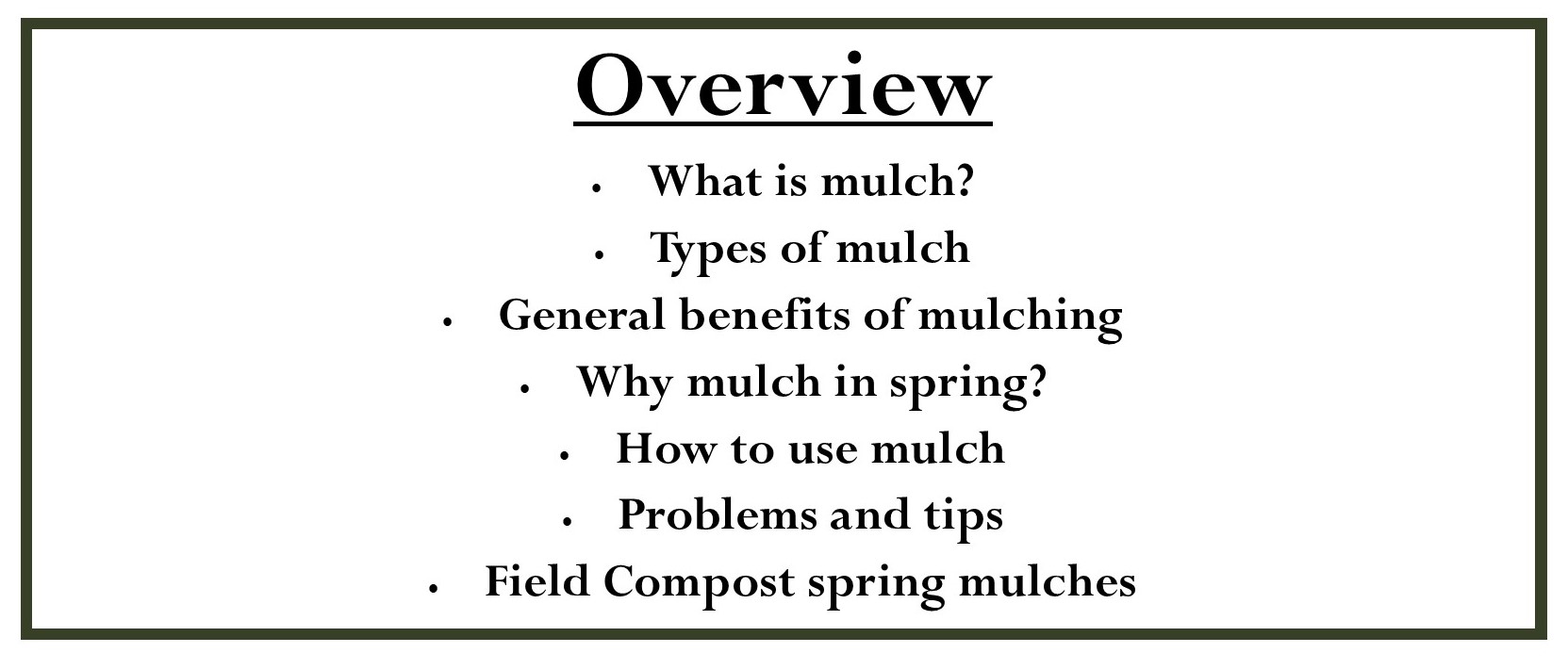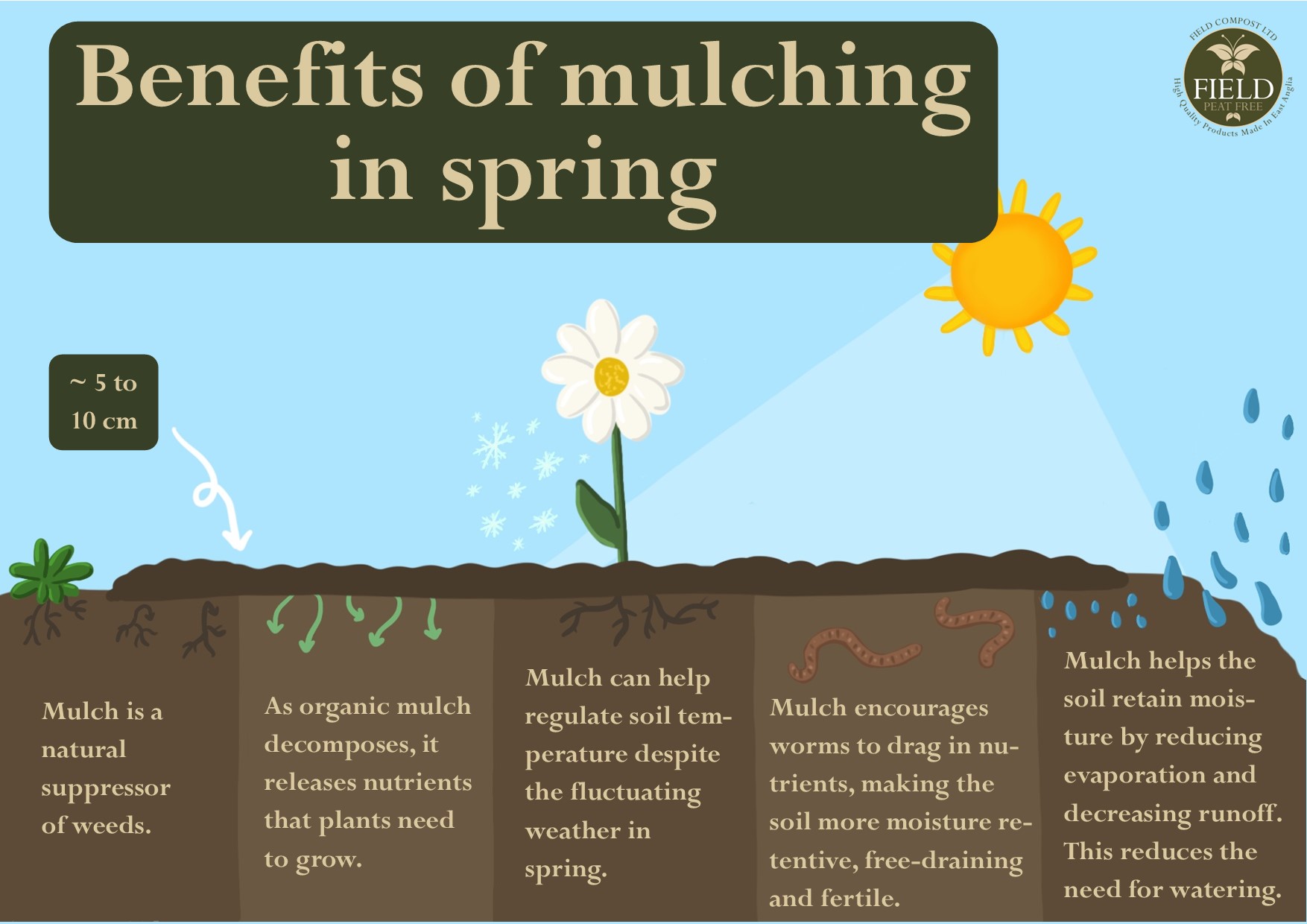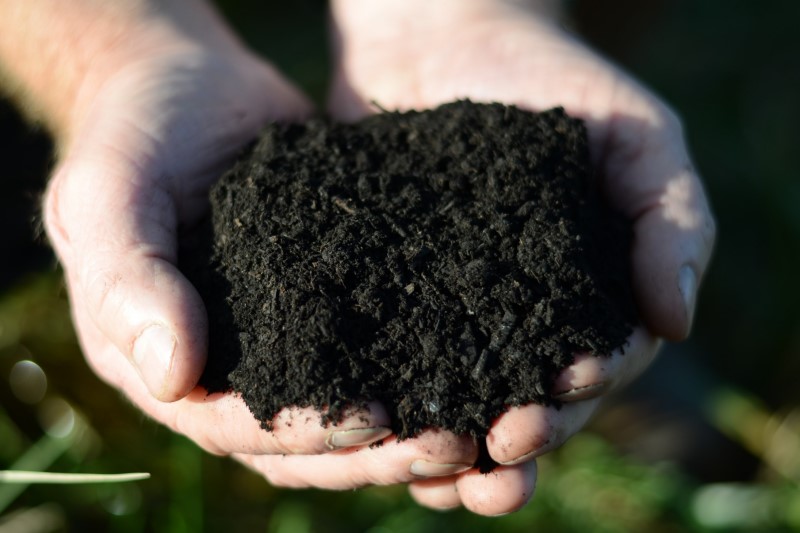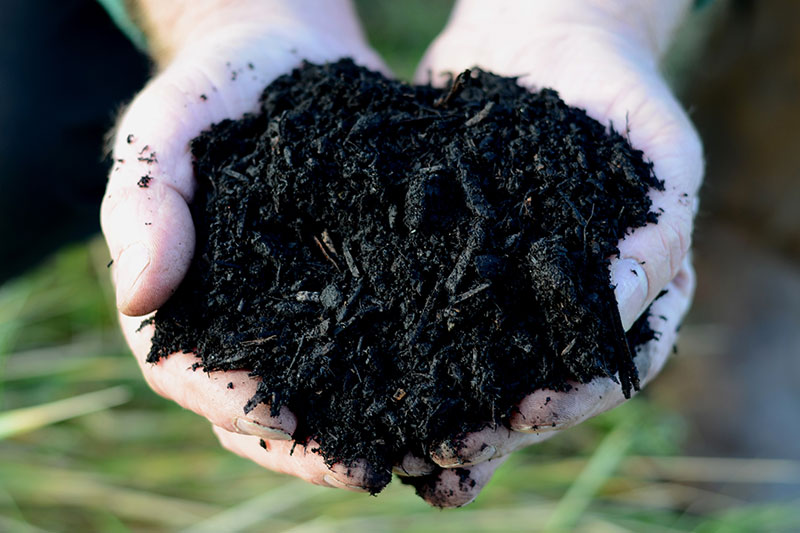
What is mulch?
Mulching is the practice of spreading a thick layer of compost, bark, or manure matter across the surface of soil and around plants. Mulches can be applied around new plantings or to established beds and specimen plants.
Field Compost has several mulching products, each made for different specific purposes. Click here to browse all mulch products or keep scrolling to see which mulches we recommend for spring.
Field Compost stock organic/biodegradable mulches, but mulches can also be inorganic/nonbiodegradable:
1.Organic
- Eg., bark chippings, homemade compost, shredded trees, straw, leaf mould, or grass clippings.
- These mulches are easier to maintain as they can be replaced by another layer when have rotted away.
- Organic mulches contain nutrients; as they decompose, they release these nutrients into the soil, acting as a slow-release plant food.
- Best for woodland gardens, borders, and around longer-term food crops (e.g., courgettes, strawberries, fruit bushes, and asparagus).Inorganic:
2. Inorganic
- Eg., shingle, gravel, slate chips, plastic sheeting, or landscaping fabric.
- It does not break down, but some products disintegrate and pollute the garden environment.
- Unlike the organic mulches, inorganic mulches do not add nutrients to the soil, and in some instances can stop nutrients from reaching the soil.
- But they can offer a long-term solution to weed suppression vs. organic mulches.
- Work best in dry mediterranean-style gardens.
General benefits of mulching:
- Mulch acts as a natural suppressor of weeds; it blocks their sunlight, thus stunting their ability to grow and reducing your gardening to-do list!
- As mentioned, when organic mulch decomposes, it will feed your plants and microorganisms in the soil, reducing the need for additional soluble feed.
- Mulch encourages worms to do the work for you; they drag the nutrients from organic mulch into the soil. This helps to improve soil structure by making it more moisture retentive, free-draining, and fertile.
- Mulch can deter those insects that are harmful to your garden, by encouraging spiders to visit your plants to feed on potentially unwanted pests on your flower bed.
- Soil that is rich in nitrogen, phosphorus and potassium provides an ideal environment for plants of all sizes but overtime these nutrients will ‘leach’ into the soil below. Mulch helps to slow down this leaching process by adding another layer for the nutrients to move through, thus enabling plants to have more access to them for longer.
- Finally, in terms of aesthetics, mulch gives the garden a neat and tidy appearance. The contrast of the dark mulch against the bright green plants and colourful flowers creates a strikingly beautiful display.
Why mulch in spring?
You can mulch all year round, with different benefits for mulching in spring and summer to mulching in autumn and winter. Spring is a great time to mulch; Gardeners’ World suggest that April is the ideal time to use organic mulch as the soil is moist and accessible as plants are just starting to grow.
- Mulching on moist soil helps the rain to penetrate the soil and add moisture. Adding this organic layer prevents quick evaporation of water and helps to reduce runoff of rainwater. This means that you won’t have to water as often!
- Mulch regulates soil temperature. In the UK, April often receives both snow and days of clear skies and sunshine. Mulch can protect the roots of plants from frost and insulate the soil, but it can also prevent plants from burning up when the summer heat arrives.

How to use mulches:
On each product page and their specification sheets, you can find more information and directions for use. But here we have provided general instructions and tips on how to mulch.
- Prepare the soil before: remove weeds by forking out perennials and pulling out annuals by hand. Also rake the surface of soil to level out the dips and hollows.
- Water the soil before you start mulching; moist soil keeps the water in. But don’t mulch when the soil is frozen.
- It is better not to mulch ground covering mediterranean plants like thymus species. Mulching these species can hold too much moisture around stems and foliage.
- Apply mulches around spring bulbs, under hedges, around herbaceous perennials, and around fruit trees and bushes.
- Using your hand, a garden spade or fork, apply around 5 to 10 cm of mulch around the plant beds and key plants, without smothering or damaging lower stems. A thick layer will suppress more weeds, but bulbs and other plants may find it hard to grow through more than 5cm. It is suggested that biodegradable mulches need to be between 5cm and ideally 7.5cm thick.
- After mulching, use a rake or garden hoe to spread and ensure an even coverage across soil.
Problems and tips:
- When planting trees and shrubs, try not to mulch right up to the stems of these plants – leave a moat of space between the mulch and the base. Direct contact between wet mulch and stems can soften or even rot them.
- After mulching, you may need to apply extra water to reach the roots of plants beneath. But do not water too frequently; mulch can help rain soak into the soil and cause less water to evaporate.
- Use a rake to thin out the mulch after applying as mulching too thickly can prevent bulbs and herbaceous plants from growing.
Our spring mulches:
Field No.1 Organic Soil Improver:
- To use on borders and lawns.
- Contains and high quantity of organic matter which gradually releases important nutrients as and when the plant needs it.
Field No.12 Nutrimulch
- A mix of Field No.1 and Field No.25.
- To use when mulching vegetables beds and ornamental borders.
- Is more fibrous than Field No.1 and has more available nutrients.
Field No.25 Maximulch
- Our manure alternative that is cleaner and contains no aminopyralid (a residual herbicide that stunts plant growth).
- Releases major nutrients and trace elements that are easily accessible to growing plants.
- Maximulch is best used throughout the growing season to feed hungry plants.
Remember: Our mulches should not be used as a planting media on their own.


